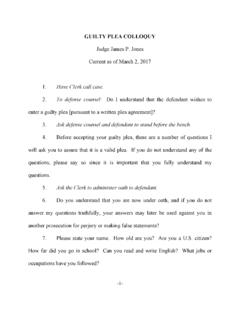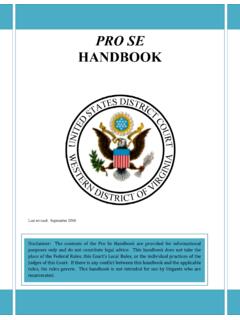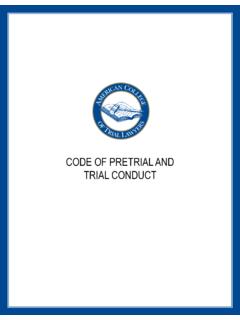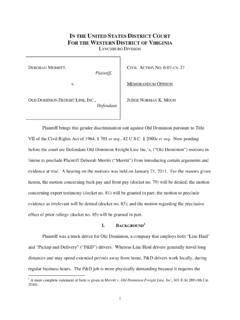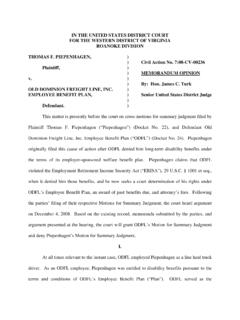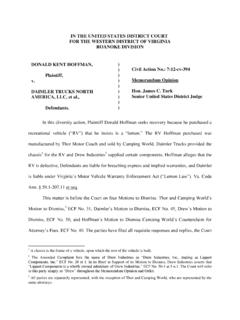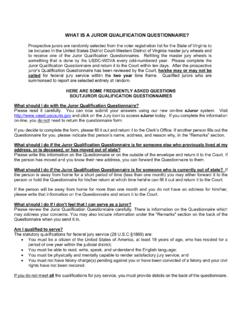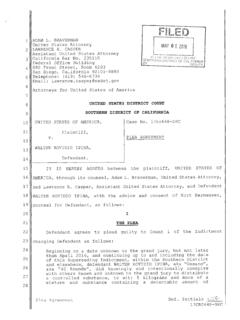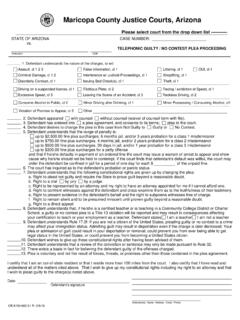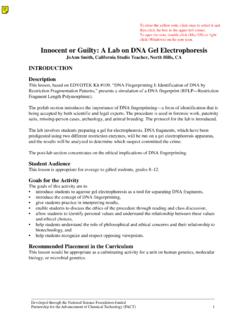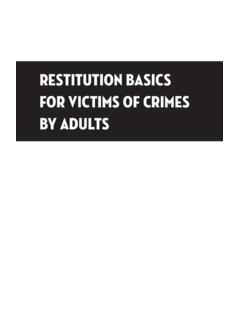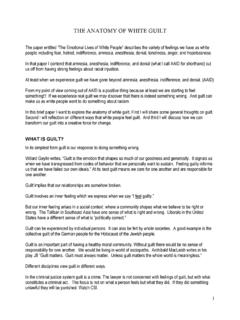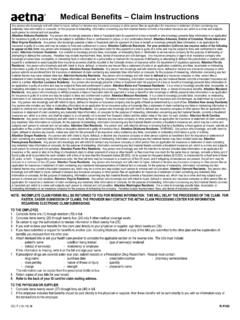Transcription of IN THE UNITED STATES DISTRICT COURT FOR THE WESTERN ...
1 This Opinion elaborates on the COURT s oral THE UNITED STATES DISTRICT COURTFOR THE WESTERN DISTRICT OF VIRGINIAABINGDON DIVISIONUNITED STATES OF PURDUE FREDERICKCOMPANY, INC., ET AL.,Defendants.))) Case No. 1:07CR00029)) OPINION AND ORDER )) By: James P. Jones) Chief UNITED STATES DISTRICT Judge))John L. Brownlee, UNITED STATES Attorney, Rick A. Mountcastle and RandyRamseyer, Assistant UNITED STATES Attorneys, Roanoke, Virginia, for UNITED STATES ;Howard M. Shapiro and Kimberly A.
2 Parker, Wilmer Cutler Pickering Hale and DorrLLP, Washington, , for The Purdue Frederick Company, Inc.; Mark , Paul, Weiss, Rifkind, Wharton & Garrison LLP, New York, ,, forMichael Freidman; Mary Jo White, Debevoise & Plimpton LLP, New York, , forHoward R. Udell; and Andrew Good, Good & Cormier, Boston, Massachusetts, forPaul D. issue before the COURT is whether or not to accept the plea agreements inthis case. 1 The Purdue Frederick Company, Inc. ( Purdue ) has pleaded guilty tomisbranding OxyContin, a prescription opiod pain medication, with the intent todefraud or mislead, a felony under the federal Food, Drug, and Cosmetic Act.
3 331(a), 333(a)(2) (West 1999). The individual defendants, Michael Friedman is the former president and CEO of Purdue, Udell is the executive vice2president and chief legal officer, and Goldenheim is the former chief scientific , Howard R. Udell, and Paul D. Goldenheim, have pleaded guilty to themisdemeanor charge of misbranding, solely as responsible corporate officers. 333(a)(1) (West 1999); see UNITED STATES v. Park, 421 658, 676(1975). The individual defendants are not charged with personal knowledge of themisbranding or with any personal intent to defraud.
4 The Information in this case charges, among other things, that[b]eginning on or about December 12, 1995, and continuing untilon or about June 30, 2001, certain PURDUE supervisors and employees,with the intent to defraud or mislead, marketed and promotedOxyContin as less addictive, less subject to abuse and diversion, andless likely to cause tolerance and withdrawal than other painmedications as PURDUE sales representatives and told somehealth care providers that it was more difficult to extractthe oxycodone from an OxyContin tablet for the purpose ofintravenous abuse, although PURDUE s own study showedthat a drug abuser could extract approximately 68% of theoxycodone from a single 10mg OxyContin tablet bycrushing the tablet, stirring it in water.
5 And drawing thesolution through cotton into a syringe; PURDUE sales representatives they could tell healthcare providers that OxyContin potentially creates lesschance for addiction than immediate-release opioids; training that taught PURDUE sales supervisorsthat OxyContin had fewer peak and trough blood level-3-effects than immediate-release opioids resulting in lesseuphoria and less potential for abuse than short-actingopioids; certain health care providers that patients could stoptherapy abruptly without experiencing withdrawalsymptoms and that patients who took OxyContin would notdevelop tolerance to the drug; certain health care providers that OxyContin did notcause a buzz or euphoria, caused less euphoria, had lessaddiction potential, had less abuse potential, was less likelyto be diverted than immediate-release opioids, and could beused to weed out addicts and drug seekers.
6 (Information 19.) Purdue has agreed that these facts are true, and the individualdefendants, while they do not agree that they had knowledge of these things, haveagreed that the COURT may accept these facts in support of their guilty pleas. (AgreedStatement of Facts 46.) The plea agreements have been submitted pursuant to Federal Rule of CriminalProcedure 11(c)(1)(C), which allows the parties to agree to a specific sentence to beimposed. The COURT is not bound by the plea agreements, and may reject them.
7 If aplea agreement is rejected, that defendant must be given an opportunity to withdrawthe guilty plea. Fed. R. Crim. P. 11(c)(5)(B). The government has agreed in this casethat if the COURT rejects any of the plea agreements, the government will dismiss theInformation filed in the case, without prejudice to the government s right to later-4-indict the defendants or any other entity or individual on any charge. (PleaAgreements 2.) Accordingly, if the COURT rejects any of the plea agreements, thepresent case may end, and it will be up to the government to decide whether to re-prosecute the defendants, or any of them.
8 In addition to a lengthy hearing on the present issue, the parties were requiredto submit extensive written material, including financial information, for the COURT sconsideration. The Supreme COURT has held that defendants have no absolute right to havea guilty plea accepted. Santobello v. New York, 404 257, 262 (1971). TheCourt stated, A COURT may reject a plea in exercise of sound judicial discretion. Id. [I]t is not only permitted but expected that the COURT will take an active role inevaluating the agreement.
9 UNITED STATES v. Kraus, 137 447, 452 (7th Cir. 1998).But as the Sixth Circuit stated, By leaving the decision whether to accept or rejecta plea to the exercise of sound judicial discretion, the Supreme COURT did not intendto allow DISTRICT courts to reject pleas on an arbitrary basis. UNITED STATES v. Moore,916 1131, 1136 (6th Cir. 1990) (internal quotations and citation omitted).While the COURT s decision must not be arbitrary, Rule 11 does not limit thereasons for which the DISTRICT COURT may reject a proposed plea agreement.
10 UnitedStates v. Skidmore, 998 F. 2d. 372, 376 (6th Cir. 1993). The authority to exercise-5-judicial discretion implies the responsibility to consider all relevant factors andrationally construct a decision. Moore, 916 at 1136. Rule 11 explicitly statesthat a COURT cannot accept a plea if it is not supported by the factual record or if thecourt believes that that the plea is not voluntary. Fed. R. Crim. P. 11(b)(2),(3). ButRule 11 also allows a DISTRICT judge to reject a plea agreement if it is too lenient or tooharsh.
